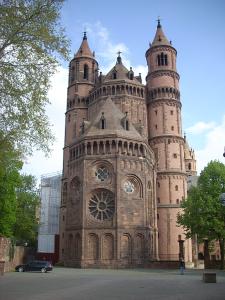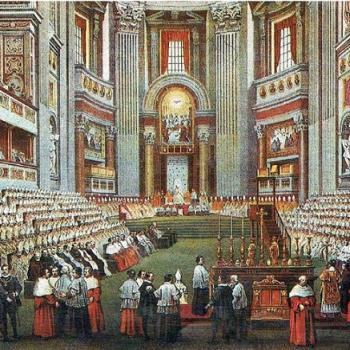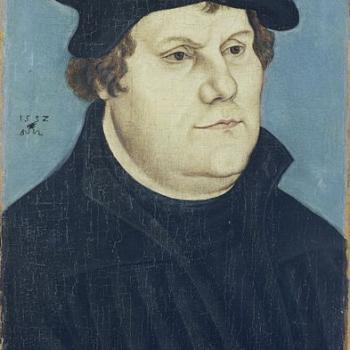
Martin Luther completed his treatise, On the Councils and the Church in March 1539. In Luther’s Works (Vol. 41) it takes up 170 pages (9-178; translated in 1966). In the Introduction included in that volume, the editors observe:
Luther’s On the Councils and the Church represents his final judgment concerning the medieval church as well as the first broad foundation for a new doctrine of the church within nascent Lutheranism. . . . Luther concludes from his analysis that although councils protect the church from error, they have no authority to create new articles of faith. . . .
Experience taught Luther to bury all hopes for any reconciliation with Rome — a sad lesson, climaxing in the conviction that “a free, general, Christian council,” once his dream, was never to become a reality. (p. 5)
I will be utilizing a different public domain translation of Rev. C. B. Smyth: published in London by William Edward Painter in 1847; available at Internet Archive. Occasionally I will cite the version from Luther’s Works for comparison or clarification. When I cite Scripture, it is RSV. Luther’s words will be in blue.
***
I have bypassed Luther’s Preface, which consists of ranting and raving and little actual argument. Likewise, I will pass over similar material in my reply and stick to portions where Luther is actually lucid and presents some sort of sustained rational argument. Luther is not Calvin, who (like him or not) systematically presents concise, cogent arguments. Unless one wants to essentially descend to a shouting match or polemics and little else (which helps nobody), one must necessarily be selective in what to respond to in Luther.
They will consign the Church to ruin sooner than they will give way in one point — that is, they will first give up councils and fathers before they will abandon anything invented by themselves. For were the councils and the fathers faithfully followed, ah, then, what a sorry figure would the pontiff and modern prelates exhibit? (p. 14)
Of course, we say precisely this against Lutherans and larger Protestantism. It’s because they have departed from the Church fathers and early councils that they have gone astray in many ways. Not only do they massively differ from patristic consensus in several major ways (as I have shown many times: see my Fathers of the Church web page); they also contradict each other innumerable times, since they have split into many hundreds of sects, and have no way to resolve that scandalous problem. Where there are serious differences of opinion, contradictions are massively and necessarily present, on one side or possibly both, in any given conflict. But Catholicism can trace itself back to the beginning, in an unbroken chain of consistent development of doctrine.
They must go to ruin, and cease to remain as lords in the ascendant. (p. 15)
Thus prophesied Luther in 1539. We’re still here, teaching the same as always, whereas his Lutherans have split into factions: most of them theologically liberal and contrary to historic Lutheranism, while a small portion remains true. If that’s supposedly the “mainstream” of Christianity, it’s a pathetic thing indeed.
Why, the universal vicar is above councils, above fathers, above kingly and divine authority, and angels! Let me see you bring him down to submission, and (if you can) make fathers and councils to dictate to the apostolic vicar. (p. 16)
I guess he’s projecting here, since he wrote 17 years earlier about himself:
I call myself an ecclesiastic by the grace of God in defiance of you and the devil, although you call me a heretic with an abundance of slander. And even if I called myself an evangelist by the grace of God, I would still be more confident of proving it than that any one of you could prove his episcopal title or name. I am certain that Christ himself, who is the master of my teaching, gives me this title and regards me as one. Moreover, he will be my witness on the Last Day that it is not my pure gospel but his. . . .
I need not have any title and name to praise highly the word, office, and work which I have from God and which you blind blasphemers defile and persecute beyond measure. I trust my praise will overcome your defiling, just as my justice will overcome your injustice. It does not matter if, with your blasphemy, you are on top for the moment.
Therefore, I now let you know that from now on I shall no longer do you the honor of allowing you – or even an angel from heaven – to judge my teaching or to examine it. For there has been enough foolish humility now for the third time at Worms, and it has not helped. Instead, I shall let myself be heard and, as St. Peter teaches, give an explanation and defense of my teaching to all the world – I Pet. 3:15. I shall not have it judged by any man, not even by any angel. For since I am certain of it, I shall be your judge and even the angels’ judge through this teaching(as St. Paul says [I Cor. 6:3 ]) so that whoever does not accept my teaching may not be saved – for it is God’s and not mine. Therefore, my judgment is also not mine but God’s. (Against the Spiritual Estate of the Pope and the Bishops Falsely So-Called, July 1522; from Luther’s Works, Vol. 39: Church and Ministry I, excerpt from pp. 247-249; see much more along these lines)
In stark contrast, popes massively consult with bishops, priests, and even laypeople, before making any major doctrinal or dogmatic pronouncements, as I recently documented. No one could disagree with Luther (if they did he often consigned them to a destiny in hell, in his singular foreknowledge). He was as autocratic and dogmatic (in the worst sense of that word) as they come.
The holy father will not succumb to any reformation of himself and inferior lords, cardinals, and prelates — no council can be of any service — no reformation is to be hoped for in the Catholic Church. Thus he tramples under foot the bare mention of any proposals, and peremptorily bids us to close our lips. Are we required, then, to allow ourselves to be reformed, and benefit the Church with their co-operation, according to conciliar and patristic patterns, when truly the pontiff and papists will not allow it to be put to experiment? . . .
Even in points of importance we would bend, so far as we could, without opposing the Almighty. Yes: we are willing to give way to the very last degree of suffering in order to avert injury and destruction from the Churches, according to the utmost of our knowledge and our power. (pp. 17-18)
“Please Hit ‘Subscribe’”! If you have received benefit from this or any of my other 4,800+ articles, please follow my blog by signing up (with your email address) on the sidebar to the right (you may have to scroll down a bit), above where there is an icon bar, “Sign Me Up!”: to receive notice when I post a new blog article. This is the equivalent of subscribing to a YouTube channel. My blog was rated #1 for Christian sites by leading AI tool, ChatGPT: endorsed by influential Protestant blogger Adrian Warnock. Please also consider following me on Twitter / X and purchasing one or more of my 55 books. All of this helps me get more exposure, and (however little!) more income for my full-time apologetics work. Thanks so much and happy reading!
***
Anyone can talk a good game, but it takes the cooperation of two parties to compromise or come to any resolution of honest disagreements. So what do we observe in the closest thing to any sort of attempt at reconciliation between Catholics and Protestants near the beginning of the Protestant Revolt, at the Diet of Augsburg in 1530? Catholic historian Warren Carroll described the proceedings and the lack of tolerance in the Lutheran party:
Early in July the bishops presented their complaints to the Diet of the plundering and destruction of churches, seizure of monasteries and hospitals, prohibition of Masses, and attacks on religious processions by the Protestants. When Charles called upon the Protestants to restore the property they had seized, they said that to do so would be against their consciences. Charles responded crushingly: ‘The Word of God, the Gospel, and every law civil and canonical, forbid a man to appropriate to himself the property of another.’ He said that as Emperor he had the duty of guarding the rights of all, especially those Catholics unwilling to accept Protestantism or go into exile, who should at least be allowed to remain in their homes and practice their ancestral faith, specifically the Mass; the Protestants replied that they would not tolerate the Mass . . .
On the 13th [of July] Luther announced from Coburg that the Protestants would never tolerate the Mass, which he called blasphemous, and said of the Emperor:
We know that he is in error and that he is striving against the Gospel . . . He does not conform to God’s Word and we do . . .
Luther stated in a letter to Melanchthon [on] August 26:
This talk of compromise . . . is a scandal to God . . . I am thoroughly displeased with this negotiating concerning union in doctrine, since it is utterly impossible unless the Pope wishes to take away his power.
In subsequent letters he declared that no religious settlement was possible as long as the Pope remained and the Mass was unchanged . . .
The Augsburg Confession must endure, as the true and unadulterated Word of God, until the great Judgment Day . . . Not even an angel from Heaven could alter a syllable of it, and any angel who dared to do so must be accursed and damned . . . The stipulations made that monks and nuns still dwelling in their cloisters should not be expelled, and that the Mass should not be abolished, could not be accepted; for whoever acts against his conscience simply paves his way to Hell. The monastic life and the Mass covered with infamous ignominy the merit and suffering of Christ. Of all the horrors and abominations that could be mentioned, the Mass was the greatest.
. . . no Catholic of spirit and courage could be expected, let alone morally required, to give up all his religious rights without a struggle; and few Protestants, at this point, would allow Catholics to exercise those rights if the Protestants were strong enough to deny them. These were the irreconcilable positions taken by the two sides at the Diet of Augsburg in 1530, which made those long and bloody years of conflict inevitable. (The Cleaving of Christendom; from the series, A History of Christendom, Volume 4, Front Royal, Virginia: Christendom Press, 2000, 103-107; see more about the council)
*
*
***
*
Or you may believe my work is worthy to support for the purpose of apologetics and evangelism in general. If so, please seriously consider a much-needed financial contribution. I’m always in need of more funds: especially monthly support. “The laborer is worthy of his wages” (1 Tim 5:18, NKJV). 1 December 2021 was my 20th anniversary as a full-time Catholic apologist, and February 2022 marked the 25th anniversary of my blog.
PayPal donations are the easiest: just send to my email address: apologistdave@gmail.com. Here’s also a second page to get to PayPal. You’ll see the term “Catholic Used Book Service”, which is my old side-business. To learn about the different methods of contributing (including Zelle), see my page: About Catholic Apologist Dave Armstrong / Donation Information. Thanks a million from the bottom of my heart!
*
***
*
Photo credit: St. Peter’s Cathedral in Worms, Germany (west end), in the same city where the famous Diet of Worms with Martin Luther took place, in January-May 1521. Photo by AndreasThum (4-17-11) [Wikimedia Commons / Creative Commons Attribution-Share Alike 3.0 Unported license]
Summary: Part 1 of my in-depth examination of Martin Luther’s treatise, “On the Councils and the Church” (March 1539), leading to discussions about the rule of faith and sola Scriptura.
















